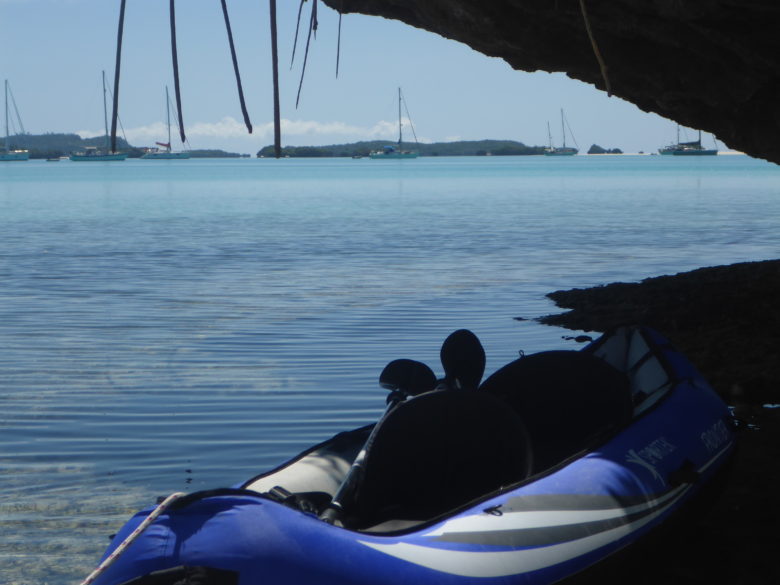“Let’s Swap Boats”
I was up early the next morning, chores to be done, beautiful day to be enjoyed in our fabulous anchorage. The washing to be wrung out and the bread dough set to prove in its own little proving oven under the spray hood in the warmth of the early morning sun, with a seat swab stood behind it to prevent drafts.
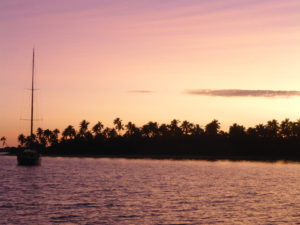
The plan today was for Rob to clean the hull and Henry’s rudder and to inflate the canoe (Puff) ready for a shoreline exploration and for Rob to go ashore and burn our rubbish below the high water line while I do what I am doing now.
Throughout our days we recall the latest viewing of Allo Allo and sometimes come out with sentences along the lines of Inspector Crabtree, the ‘French’ policeman, “Good Moaning”. A little nostalgic fun for us olds.
The only rubbish we have left on board is flattened tins, soft plastic and beer bottles. The only waste we discard into the water is organic and I cut papaya skins into small pieces first both to help it rot down and to comply with the regulations.
Sitting in the canoe enjoying our gentle paddle around the lagoon Rob said quietly, “No more fishing, I don’t want to catch any more fish, it doesn’t seem right.” I was delighted. The rod was duly walked from the stern into the forecabin for storage.
“But you’ll go on eating fish right?”
“Yes, but after yesterday I don’t want to take any more beautiful fish from the water.” I was relieved because now I can choose to not eat fish anymore and be a vegetarian again sometimes anyway.

At the top of one of the many beaches we explored were two long rusting metal tubes big enough for a man to crawl inside and complete with anodes. They looked like some sort of floating platform used to transport items like wood planks to the island. They were well rusted and could have been there for decades.
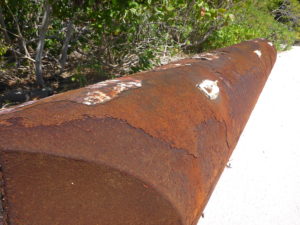

You will see the photo of Rob holding a beautiful round undulated coarse sand structure, so delicate it was falling apart under its own weight so he gently laid it back in its home. A solitary turtle swam away from us, sensibly preferring his own company as we paddled back to the mother ship.

Teri and Mark were out for a sail in their pretty sailing tender and came alongside briefly to say they were off to the main anchorage in the morning to collect their order from the supply ship,
“Why don’t we swap,” I suggested, “You take our tender with the motor and we go for a nice sail in your dinghy, that way you don’t have to move Wavelength and we refresh our sailing dinghy skills!!” So we were the proud owners of a beautiful little mover for just a few hours.


The once monthly supply ship is keenly awaited almost from the moment it leaves. As I have mentioned passage on it is expensive so most of the villagers can only watch as it arrives and leaves and wonder how their diaspora of family is fairing in Suva and on the other islands. Anyone travelling to Suva on village business has their fare paid by the communal fund.
I was well into making my own coconut milk now. Hand squeezing the coconut Jone had grated for us in a little water. It had no keeping quality as liquid, unlike the grated coconut that would keep in the fridge until we had finished it. The milk I used in curries, bread dough, Chinese cabbage and the residue coconut went into cakes and flapjacks. Only the shell went overboard.

One sad delivery on the supply ship the next day was a little girl, around ten years old, from the next village who had undergone a brain tumour removal in Suva hospital. She was now paralyzed from the neck down and was carried gently back home.
So the next morning, just after six am I saw a battered black vessel, with a Chinese sampan like gunwhale sheer rising to the stern, creep across the far lagoon towards the main anchorage and upon a summons from a fellow yacht we watched an assortment of dinghies and yachts making their way over the lagoon to collect their produce.
For us it was “hoist the mainsail me hearty, let’s go for a sail.” Our little white boat slid effortlessly over the smooth water with first one and then the other of us taking a turn at the helm. It is one thing we miss as cruisers, dinghy sailing and we often reminisce on little Zoonie, our Heron dinghy that is nestling safely in Rob’s mum’s garage at the moment.
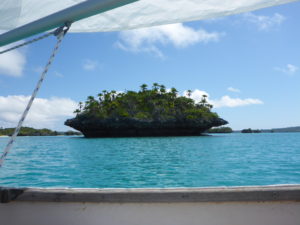

That evening we joined Mark and Teri on Wavelength and Kevin and May came along from Whistler HR out of Melbourne. Kevin told us he had chatted with a villager who he’d seen selling coconut crabs to a Chinese Restauranteur from Suva for $20 a kilo. We were all concerned considering their closeness to extinction. There is an email address we can use to pass on such reports. Not wanting to get any individuals into trouble it might instead provoke the environment group to come and do a survey in this area as they have done in Northern Lau and inform the locals of the need to conserve these crabs.
The next morning there was a little tap on Zoonie’s side and Gal had arrived and was clutching Zoonie’s toe-rail as he balanced on his paddleboard. He is from the 25 foot boat called ‘Ofek’ and he set out alone from Israel to sail to Australia. In Panama he was joined by Marlena from Poland. Together they plan to live on her while they work in Aussie. Gal is a qualified commercial skipper and hopes to get work in that profession.
We had often looked at the valiant little boat that has sailed so far and I reflected on my friend Henry Piggot of Shopley Southampton who has sailed around the world twice in his 20 foot Colvic Watson ‘Glory’. It can be done.
“So is the meaning of her name the expletive or something else?” I asked,
“Ofek is Hebrew for Horizon.” Gal explained with a dead pan face. He asked if we had a big sewing needle he could borrow to sew two patches onto chaffed areas on his mainsail. We said we had a sewing machine so he could bring the sail over and we would see what we could do.
While he paddled back and took it off the boom and into his dinghy we set up the machine ready. Well I have never seen such thick sail fabric. Every time the machine needle went through it the sharp edge of the hole cut the thread. We didn’t have thicker thread, only whipping twine which was like overkill. So I made the holes with the machine and then Rob and I took it in turns to hand sew through the pre-made holes. We just did running stitch so suggested to Gal that he might like to go over ours filling in the alternate stitches but I don’t think it will be necessary. Hopefully it will suffice until they get to Australia.
Gal wants to sell her for a bigger boat at some stage but as she had osmosis in her hull and water damage inside he won’t be looking at making much money from her. “Best live on her cheaply while you are working, “Rob said, “and sell her when you have your next one to move on to.”
That afternoon Teri and I went for a two hour paddle in the canoe and chatted non-stop for the duration. On top of a rock was a grey heron with long yellow legs, or was it two? They were almost exactly in line so we weren’t sure until we glided around behind them. It was a pair, like bookends!
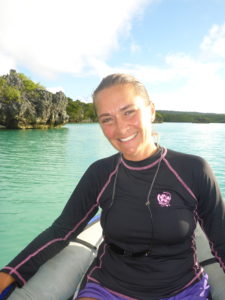


The next day we made our way, carrying a sliced cake baked that morning, to Mere’s house for what we thought was going to be our farewell party. Mere was pouring the finishing touch of custard onto her signature dish, custard sponge and looked surprised to see us.
“On Thursday we had a staff meeting at the school and decided that today we would all go to visit the sick little girl in the next village, so that is what we are doing this afternoon. I am so sorry for the mix-up, could we have your party on Monday instead?”
Of course that was no problem, we had plenty of time, but very sadly the little girl did not.
Every day the boats in the anchorage change. Ofek left early the next morning on her dicky batteries, faulty charger and repaired main and her timing would give her a bumpy ride at the seaward end of the passage. A few hours later she radioed from the next island asking for an up to date weather forecast so we know she was ok.
“Bula Mere, how was school today?”
“We spent all morning trying to remember what they learned last term!” Well that rang some bells, from my teaching days!
“Rob you shall be king,” Bill exclaimed as we sat ready for the kava session at our party. That meant he should say “Taki” to the kava man to start the next round. The session had started gently with Jone doing the honours and dispensing the drink to us, then gradually 15 or so others joined us, seeing from the path outside that a party was underway. Children came in and shook hands with us, some of them knew our names by now and we theirs.
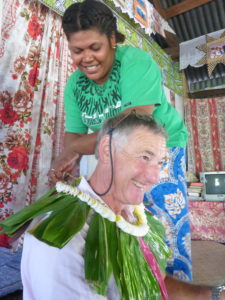
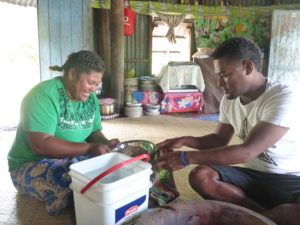
It was an interesting time because we had some discussions about life in Suva versus life here. Tui and Bill became serious over the tensions with the Indian Fijians. Bill said that Fijians don’t see skin colour as a basis for prejudice and resentment and Tui must have genuine cause to feel as strongly as he did. “I understand, I have read about some of the issues,” I said.
Some of the young girls stay on in Suva and marry there, finding jobs in shops and offices, whereas it is harder for young men to find jobs and the pressure to earn money is something they are not used to. Tangy took over serving the kava, he is showing off his Fiji T-shirt in the photo. He was so very polite each time he gave us our cup “Bula Barbara and vinaka” he went on to explain, softly “Why would I live in Suva and have to earn money when here I can work for all I need.” They are so blissfully unambitious and place little value on money, which is so unlike the world we have grown up in.
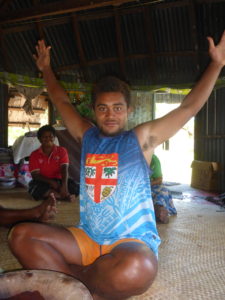
Sometimes the conversation would quieten and ‘Bula’, the oldest villager present would give me the wink and I nudged Rob to call “Taki” which would immediately liven things up again.

Some of the expanding group shifted to one corner and started playing cards with the RNLI pack we had presented to Mere. A little boy fell fast asleep on his mum’s lap despite the loud slapping down of the cards. Many skewer like cigarettes were being smoked and as the doors were closed against the cool of the evening the atmosphere was becoming heady. A fusion of western and Fijian music was playing on a little speaker, blue-toothed from Mere’s phone.
I caught Mere’s eye to say we were ready to feast, Bill having told me this was the form and we ate alone, being watched by some of the ladies. I asked them to eat with us but this was their custom so I had to put up with my feeling awkward.
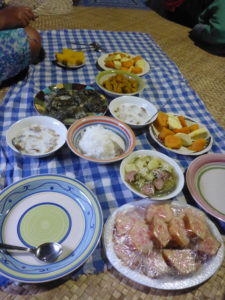
“We have something for you but I need to finish it. Can we meet you at the beach at 12.30 tomorrow Barbara?” I like a surprise I said as we prepared to leave, turning on our torches for the after dark walk back to the beach.
We waited on board the next morning until we saw them arrive and motored ashore in the dinghy. Mere unloaded a plastic box with some more lovely grated coconut fresh that morning and we transferred it into our box. Then from her back pack she pulled a pandanus mat, yes a real pandanus mat trimmed with brightly coloured wool (Mere’s work) for us to keep. I was overwhelmed with pleasure, the thought of our own mat made with such care and precision by these clever village women for us to keep forever was stunning.
“Will you leave today?” Mere asked.
“There is a 25 knot wind coming soon so we’ll probably wait over in Sandspit until it has passed.” Rob explained.
We thanked them, also for the breadfruit, Chinese cabbage and papayas and after big hugs stumbled back to the tender, lost for more words.
The wind was the result of a squash zone forming between two weather systems to the south of us. Wavelength had anchored in a new place and we felt as we motored past that we would be more exposed near her so we spent the night where we had planned and then motored to a spot near Wavelength the next morning.
Well Wavelength was like the Marie Celeste, deserted. I busied myself making a vegan casserole, the norm now on Zoonie, and added a taco sauce mix to it for flavouring. Now, I thought as I did a 360 look around through Zoonie’s deckhouse windows looking for our wandering sailors, a Mexican casserole needs a Mexican lady and as Teri is Mexican we shall invite the two of them for supper. Eventually their pretty little tender, now named Minnie because of the mouse on her sail, appeared from behind some rocks, this time with Mark manning the oars.
We waved them over and together we enjoyed a lovely last spontaneous evening together.
It was finding I was down to the last batch of flour for bread-making the next morning, so that clinched it for me and I broached Rob with a suggested change of plan for the next few days. We had been six weeks out of Savusavu and were running out of various food items and money and I was also aware dear reader that you have been deprived of photographic evidence of our meanderings for far too long. So we needed some strong internet connection too. Rob agreed we should head for Suva, and start with an overnight crossing to Matuku which is on route. Then after a few days in Suva we would spend a few weeks around Kadavu, an island to the south, before returning to Suva to clear out with Immigration and Customs and leave for New Zealand.
I was beginning to feel excited.
Farewell Fulanga, Good Morning September
Our departure from this beautiful place was literally under a cloud, total cloud cover in fact, not conditions ideal for nipping around coral heads and skirting jagged reefs. But the time and tide were right, so with four others and Zoonie second in line we made our way cautiously from the anchorage just at start of the flood tide. I was going on what we had experienced in our snorkel with Peter and Martina, that the turbulence I have mentioned would flatten out just after low tide. Was I right?
We had shared a confidence building lunch of soup with mung beans and fresh bread on Wavelength with Mark and Teri before we up anchored at 3.20pm just ahead of them. Rockstar was already outside and we carefully made our way back down the black track line on the chartplotter that we had made on our way in almost three weeks before. Rob said that he could not see into the water until it was just under the bow because of the grey sky and lack of penetrating sunlight. Never before had we placed such trust in the black line and our own local knowledge alone.
As Zoonie arrived at the top of the passage I felt relief, because we had passed the coral heads and we knew the main channel was free of obstructions. All I had to do was steer her through the disturbance I could see at the end. The water hadn’t settled yet, maybe we had needed to leave a few minutes later. It didn’t matter, Zoonie took it in her stride with contained and sturdy movements which I could easily respond to with some corrective steering. I recalled the channel near the Alderney Race in the Channel Islands where Zoonie had pushed through a five foot wall of water and this was nothing like that, although it can be.
Wavelength’s course once she was outside diverged from ours and we were unable to raise them on the VHF. Fulanga disappeared under a shower of rain and we hoped the islanders were getting plenty as they have been without for so long. Ahead of us were 93 miles to cover to Matuku, (19:09.67S 179:45.122E) the most south western island of the Lau group, through the night and in disturbed seas.
Zoonie sailed beautifully but the motion was so irregular that restful sleep was impossible. It was a relief to see the early signs of dawn in the eastern sky. I sat in the cockpit watching the dawn horizon through the red ensign wondering whether actually seeing through the flag had always been possible or has it worn thin with all its loyal, patriotic flying.
The entrance to Matuku was lovely and wide, visibility was good and we soon found a comfortable spot in the middle of the anchorage, surrounded by forested hills we were in a protected spot. Four villages had been in view on our way in but there was just one at the end of the harbour, Lomaji and Chico was its chief.

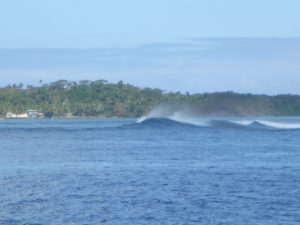
He came aboard the next morning and for the first time we did sevusevu on Zoonie. He allowed us to explain that we did not go ashore on our arrival because we were so tired we slept for two and a half hours in the afternoon. He was very understanding and went on to tell us about his wife and six daughters, no future hope of training a son to take his place as chief.
He was at odds with his villagers. Recently when he was away from the village briefly the villagers had a meeting and decided that they wanted to introduce the host family policy we experienced on Fulanga, but he totally disagrees. He feels hospitality should not cost the cruisers money and can see this trend as part of unwanted and unnecessary monetarism in an essentially non-commercial society.
“Villagers think that you cruisers have lots of money and that you are rich and so they can ask you for money, but I know you are not all rich so we should not make that demand.”
Of course there is merit in both views and with the social systems under constant change who knows where the Fulanga system will lead. Personally I cannot see the Fulanga system doing any harm at the moment and because the arrangement meant we had a forum in which to make real friends with the villagers (that will continue by email with Mere hopefully; yes we have just had our first exchange of messages) then there are mutual gains to be made. We get to know and understand them and they get to know people who have no religious, political or commercial reason to be there, just wanderers with a genuine interest in them and their way of life.
At some of the other places we visited we were greeted with courtesy and a short chat but the relationship progressed no further. Whereas with the hosting system real friendly bonds can be nurtured. Money is a tool and can be used wisely.
Chico told us recently of a cruiser whose yacht got into difficulties on his way in to Matuku. The engine stopped and he was drifting towards the reef. A local fishermen took a line to pull him into the anchorage but his own outboard motor kept stalling. “He had to start it many times before the cruiser could drop his anchor safely.” Out of gratitude the sailor gave the local a spare outboard he had. “The villagers were furious the fisherman had received this gift and said it should be given to the village.” What use that would be is hard to imagine, as all the male villagers have their own outboards. So the villagers wanted the motor to be sold and the money given to the village. The yachtsman wasn’t going to tolerate such pettiness. “You sell the outboard then and send me the money!” He told the grateful villager who got to keep his gifted motor.
We shared our knowledge of the lost island of Burotu, Fiji’s Camelot a few miles south west of here. It is worthy of its own slot in Zoonie’s blog and I will write it soon.
Talking of outboards and boats, Chico showed us a leak he had in his boat and asked if we had anything with which he could seal it. Rob rummaged in the paint locker and found some two part epoxy filler and Chico went off well happy.
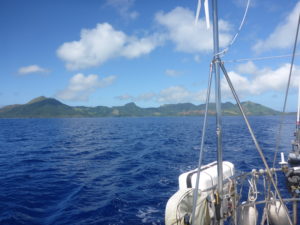
Later in Suva we chatted with Linda and Jamie from Sol who had spent a few days in Matuku. All six of Chico’s daughters had come aboard their cat for a party and they spent a few days wandering the lovely tropical jungle paths with him. For a moment I regretted our haste.
The opening up of Suva was not glamorous at all, but then we did not expect it to be. We had motored from Matuku, disappointingly, as the wind was perfect for the Diva, but the dinghy was tied over the forehatch so not only could we not get the Diva out, but with the dinghy there the free run of the Diva’s lines was blocked. Still we had made plenty of water by the time we arrived outside the reef and the batteries were well charged.
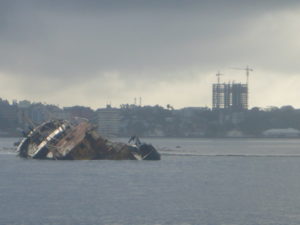
We snacked on peanut butter and jam digestive biscuit sandwiches and mugs of hot chocolate just before I took over the helm from the auto pilot for the entry and Rob went forward to become her figurehead observer. We had been told what to expect, wrecks on the reef, tick, deserted ships all around sometimes three or four to one mooring or anchor, tick, a foul bottom on loose mud, half a tick. It was thick mud where we anchored (the best holding) but Zoonie dragged at the first attempt. When Rob retrieved the anchor we found out why, it had a large clam shell wedged on the tip and a black oily sack wrapped around it. (18:07.29S 178:25.25E)
Finally secured I checked the terrestrial radio and found BBC World Service on FM 88.20MHz, things were looking up, news and culture presented in an intelligent way.
We went ashore and took a taxi to town (normally $8.00 return), well that was the idea but by the time the taxi driver had finished we had topped up our internet modem and phone at Vodafone, perused the newly built shopping complexes, been moved on by a security officer in a white Sulu with pointy hem at the gates of the parliament building, seen the president’s residence (did you like the assonance there?) and done a shop at New World before he dropped us, grateful, back at the Royal Suva Yacht Club where we had left the tender.
We hadn’t asked for all the extras but that was our city tour done, plus shopping and Vodafone shop and location of Immigration and Customs for when we leave, all from the comfort of an air conditioned taxi, we weren’t complaining about the $60 (£26) he charged.
After some refreshing cold beers at the club we returned to Zoonie looking forward to connecting with home and the outside world, a viewing session with Black Adder and a good night’s sleep.
The next day was satisfying because we talked to all our family with the exception of sister Sue and youngest son Jonty. Sue was out on the links all day so missed her birthday call and Jonty is busy with his studies in Oxford. Also as you know I put 20 photo files on to the blog and started working through my ‘must Google’ list.
Remember the island of Naitauba we passed on our way down to Vanua Balavu that was home to a US religious sect? Well from 1965 to 1983 it was owned by the actor Raymond Burr of Perry Mason and Ironside fame. He and his male partner were benevolent owners and when they came to sell they insisted it went to someone who would look after the sanctity of the place and the general welfare of the villagers. So it was bought by a leader of the transcendental meditation movement and they have owned it ever since. People of a like mind, to rid themselves of materialism and take on a wholly spiritual way of life, are welcome there.
Our friends Steve and Judy had been stuck in Suva for two months on Code Blue trying to fix their auto pilot issues. We discussed them over a drink after returning from the big market in town. It was good to see them again and we felt for them. All that way from Whangarei and they hadn’t yet done any island hopping. Still they were planning to leave the next morning so we decided to take their spot in the anchorage because it was a lot nearer shore and Rob wanted to start topping up the diesel tank.

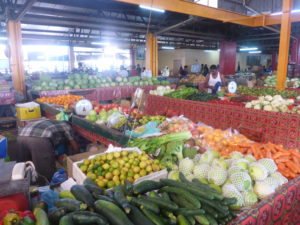
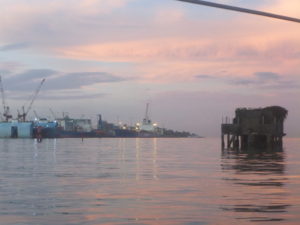
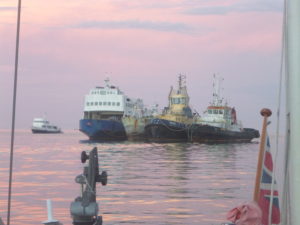
This he did by taking the 4x20ltr cans ashore in the dinghy, catching a taxi to the nearest filling station and bringing them to Zoonie, emptying them into the tank and repeating the process 3 times. We have this thing about dirty diesel, or diesel that has been given a drink of water. We have heard sad stories of people whose engines, one of them new, have been ruined by tainted diesel so we like our supply to come from a regular garage where the locals fill up, if it’s possible.
So after three days of jobs we were ready for a little culture. For exercise we walked in to town on Constitution Day having been told the Museum would be open. After the hot walk and stroll along the prom we found the Grand Pacific Hotel and it certainly lived up to its name. From the terrace where we sipped our iced coffees and ate our colourful cakes there was what must have once been fine views over Suva harbour.
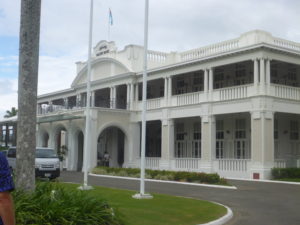
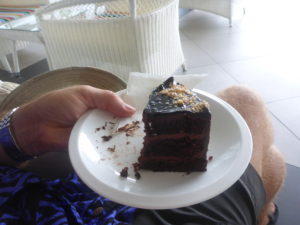

Now one looks out on skippers’ mistakes and owners’ financial disasters, vessels that so nearly made it in but not quite. Ocean going fishing boats, once white and proud, lashed together, hugging the same mooring and sinking into a rusty demise. Earlier this year, in a storm, some broke free from their inadequate lines and meandered across the harbour damaging anything and everything in their path, including anchored yachts. A couple we know whose yacht had been in the yard in Whangarei for months of refit did not expect any financial recompense for the repairs costing more than a thousand dollars they were forced to pay.
But the hotel was beautiful and the staff the usual warm and friendly Fijians.
“The museum is just over there but it may be closed today as it’s a public holiday.” She was so right, but never mind we went to the top floor of the gigantic MHCC shopping mall as that is where the food hall is and it was lunch time.
So much choice, too much choice. We settled on some Indian dishes and carried them to seats that looked out over the busy street as it poured with rain. $15 for as much as the two of us could eat kind of made up for the $60 taxi fare in our evaluating minds.
We shopped in the supermarket within the mall then trundled our bulging trolley along in the dry underneath what look like an attempt at Art Deco covered sidewalks. There are still a few colonial style verandered buildings amongst the hideous sixties blocks and the modern high rises. Definitely some art deco features from what I remember of Nelson and Hastings in New Zealand and what is common all over the world it seems, unmaintained road and pavement surfaces.
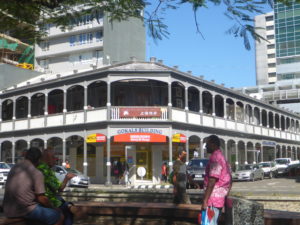
I guess there’s no money to be made from resurfacing roads so they are the first civic facility to be neglected. Did you know the average time span for re-surfacing roads in the UK is 70 years? I used to ask my driving pupils this and they were amazed. That’s partly because most of the money goes on the heavy use roads like trunk roads and motorways that we see. Think of the ones we don’t see like housing estates and country roads!
We caught a taxi back to the club and waited for the rain to ease while having, you guessed it, a nice cold beer.
The Royal Suva Yacht Club deserves a mention. It gives all the signs of having once been a very happy enclave of sailing fun during the colonial years. All around the walls aging photos and awards boards tell the story that appeared to continue until the early eighties. Politics and the building of a prison and army barracks just across the road are largely the cause of its gradual demise.
Fiji became a crown colony in 1874 and the British brought Indians in to work on the sugar plantations. Another exodus of Indians arrived here after partition in 1945 and the sheer weight of numbers and Indian political ambition has caused massive tension between the two groups to this day. There is still a military government here although the election due this month could change that.
Anyway two violent military coups took place on the street outside the club in 1987 and after that the soul of the place seems to have withered. The once large ballroom that takes up half the floor area is now without purpose and the remaining furnishings are hard wood and uncomfortable; the discomfort within reflects the discomfort of the population without. We motored back to Zoonie in the rain, unbothered because at least the rain is warm.
That night things were not right with Zoonie. I found the floor around the companionway was wet with rain. Shouldn’t happen I thought, she faces the wind and rain when she’s at anchor. But my sleepy brain went no further along that train of thought.
“Barbs, we’re facing the wrong way.” Fortunately Rob’s brain was working just fine. “Somethings wrong and I can’t see the tripping line buoy.” We both clambered on deck and hung heads over the side looking for the little red buoy, if we could see it then all was well. But we couldn’t.
Also Zoonie’s rudder was hard to port, she was effectively hamstrung by the tripping line and anchor chain and if we didn’t rectify the situation soon then her anchor could be lifted by her own weight and Zoonie would become another offending vessel drifting across the anchorage underway but not under command.
My gallant Rob went down the stern ladder with the boathook into the water and soon saw the red buoy using his head torch. It was set hard against the rudder and the line was wedged in the tiny gap between the rudder and the skeg just infront of it.
He pushed down on the line trying to clear it until the hook broke off the end of the boathook. I handed him the spare and finally he was able to clear the line down the gap using his foot, fortunately he had cleaned off the barnacles a couple of weeks ago or he would have got some cuts. Little red buoy bobbed happily off to starboard at the same time as a much relieved Zoonie started to swing back to the same heading as all the other boats. Phew, potential crisis averted thanks to Rob.
